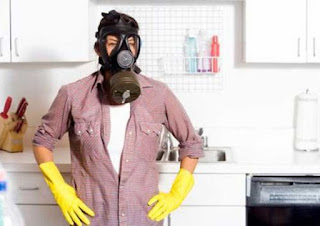

What's Under The Covers?
As a Realtor showing homes and investment properties in the Pittsburgh area, I am always looking for things to uncover -- things that the average looker may not see. I do this to help determine if a property is a good investment or a bad mistake. Looking under the covers makes you aware of anything disguised as a dream that could become a nightmare. This is a good idea for everyone to do. So let's look at a few examples:
Drop ceilings, paneling on the walls and questionable electric connections are just some of the things worth a second look. When touring a home or investment property, feel free to be a bit invasive like looking under the sinks, going up into the attic and down in the basement. Surveying the walls for mold or walking around to find a sloping floor or pooling water is important. And not just limited to the inside, walk the perimeter of the outside looking for stained and peeling paint, improper grading on the exterior, soil/water going into the building. Examine the property for termite damage which could be shown by splintered or tunneled wood. These are just some of the things to look out for -- you may have to search high and low for them.
If you can, climb up into the attic and go down into the basement. Review where water is flowing as there could be potential water damage. Outside look at the downspouts. Are they properly installed? If they are not conducting the water accurately, over time, there could be water damage. Also camouflaged brick work might be hiding something. You can tell when things don't line up right. Shrubbery may also be hiding something, so feel free to get in there and look at the foundation. These are things you want to see and look at.
But there are also things you will want to smell. And I'm not talking the freshly baked cookies or a candle that many people stage at a home showing. I'm referring to the excessive existence of these cover ups. They may be hiding noxious, potentially more dangerous, odors. Pets and cigarette smoke can be rectified but mold and mildew needs remediation and can be caused by improper ventilation issues. We've talked about seeing things and smelling stuff, but let's not forget touch.
Soft plaster and floors that give when you walk on them are red flags and need to be investigated further. If you are walking from room to room and feel major temperature changes, it could be something as simple as vents closed off in certain rooms, but it could also be something far more serious.
The goal here is to do your due diligence. I know it seems like a lot when you are going into a property for the first time and you may not feel comfortable looking like Inspector Clouseau. Not to worry as you don't have to go it alone. An experienced Realtor will see the writing on the wall even if it's written in invisible ink. With that said, it is crucial to point out that a Realtor is not an Inspector. Hiring an Inspector to inspect a home or investment property is very wise.
When do you need an Inspector? After you've made an offer on a home or investment property and it's been accepted. A home Inspector will check out the house for major flaws that might need to be fixed. They inspect the roof, full exteriors and interiors including garages, structural elements, plumbing, electrical, heating and air conditioning plus all of the components that are subject to a home inspection. Yes it costs money and the buyer is expected to cover the cost, but it's so worth it.
Things may look like they are in great condition, but looks can be deceiving. An Inspector's discoveries can help big time provided, of course, that you have included an inspection contingency on your offer. This allows you to renegotiate certain items with the seller to fix or instead have you fix. Now with that said, some issues are minor so don't feel you need to haggle on every single detail. Things that are structural or of a safety issue should always be addressed. And if a seller is unwilling to do so, or to compensate for, then you may have the right to walk away from the deal. Your Realtor, can help in the negotiation process. You don't want to lose the deal if you don't have to.
Word to the wise is to inspect a property and have someone experienced with you to point out things. You don't have to go it alone when it comes to buying a home or investment property. A Realtor's life is touring properties day in and day out. They live and breathe real estate. They see enough houses and buildings to know what things to look out for. They can certainly raise the red flags but you still need an Inspector to identify them with a plan of action for repair. The old adage that "It takes a village to raise a child" is also true for a property you are considering. It takes a group of experts in their unique fields to help you find "What's Under The Covers?".














Comments